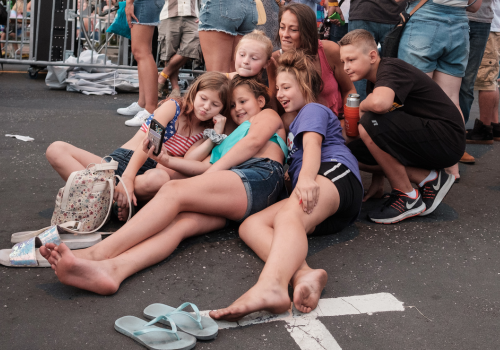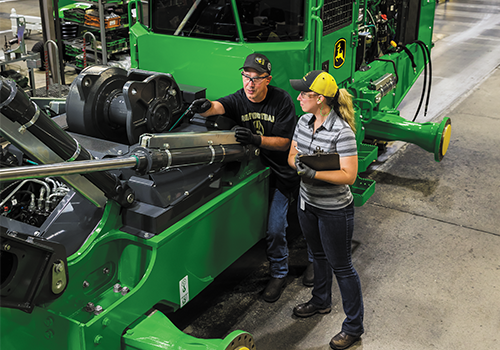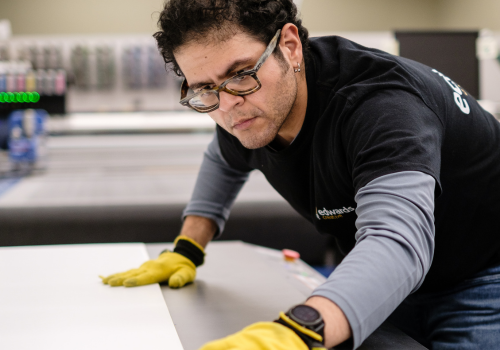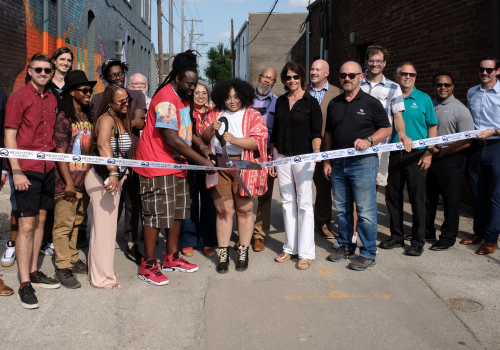Regionally focused organizations align with Q2030 to transform Quad Cities

Community leaders officially launched the Q2030 Regional Action Plan to transform the Quad Cities region into a leading metropolitan area globally recognized for talent, jobs, tourism and economic opportunities for all.
More than 240 business, government, education and nonprofit entities publicly endorsed the unified vision, and by doing so, pledged to set regionally-minded priorities and goals in alignment with Q2030.
The Quad Cities Chamber, United Way Quad Cities, Visit Quad Cities and Quad Cities Community Foundation have been committed to advancing the Quad Cities through Q2030 since its inception. Here are some great examples of how their organizational work plans are doing just that ...
Quad Cities Chamber
Earlier this year the Quad Cities Chamber set ambitious goals, in alignment with Q2030, to build a winning Quad Cities region. The Chamber can lead big ideas to reach the following goals by harnessing the region's collective ability to advance a prosperous economy:
1. The Quad Cities population reaches a half a million people
2. The region's Gross Regional Product (GRP) grows to $40 billion
To build a winning region, the Chamber identified five core areas for action:
- Economic Development – driving business investment in core industries
- Placemaking – advocating for cool places throughout the region and investments in all downtowns
- Business Services – helping businesses succeed in uncertain economic conditions
- Q2030 – provide stable backbone support for Q2030 to achieve our collective vision
- Talent Development – growing the region’s population and creating community leaders
“We don’t want to settle, and we don’t want to be mediocre,” Chamber President & CEO Paul Rumler said of the Quad Cities. “We want to be the best in the Midwest, and most importantly, we want to win, which is why we’ve endorsed Q2030 and are a strong supporter of it.”
Fulfilling the Chamber’s Q2030 objectives, Rumler added, will require partnerships with United Way Quad Cities, Visit Quad Cities, Quad Cities Community Foundation and other leading organizations.
United Way Quad Cities
To better align with the regional action plan, United Way Quad Cities integrated findings and priorities identified during the development of Q2030 into its workplan.
Key to the success of Q2030, United Way President & CEO Rene Gellerman said, is accountability and setting clear goals. The organization is determined to work with its partner agencies to help Quad Citizens live better lives and, in the process, achieve the following Bold Goals by 2030:
Education
- 90% of kids are ready for kindergarten
- 80% of third graders read with proficiency
- 90% of students graduate from high school
Income
- 65% of adults obtain post-secondary credentials or degrees
- 75% of families are gainfully employed and self-sufficient
Health
- 65 is the overall well-being index score achieved by Quad Citizens
- 88% of Quad Citizens report having good/very good mental health
“These are our bold goals that are aligned with Q2030, and they’re what drive our human and financial capital,” Gellerman said at the Chamber’s AMp Up event on Nov. 20, 2019. “Education, income and health: Those are the building blocks for a quality life and the foundation for a strong community. And they’re all interconnected.”
Visit Quad Cities
Not long after Visit Quad Cities President & CEO Dave Herrell stepped into his role a year ago, the organization revamped its vision, mission and brand promise statements to capture the essence of Q2030.
And the vision statement alone illustrates the direction Herrell plans to take the Quad Cities region: “The Quad Cities will be recognized internationally as a must-experience riverfront destination.”
“Our intent was to be intentional, laser-focused and put the peg in the ground as it relates to having a bold vision,” Herrell said. “And, as we work hard and collaboratively with our partners for competitive identity and a sense of place, we needed an overhaul to demonstrate we are an organization poised to serve more effectively.”
Visit Quad Cities also is working on a long-term Tourism Master Plan for the Quad Cities to shape perception and drive the region’s visitor economy in a positive direction. Scheduled for completion in the first quarter of 2020, the plan will serve as the playbook for how public and private sector leaders can build the Quad Cities regional destination through tourism.
As part of the project, a survey of almost 2,000 residents found 48% of respondents brag about living in the Quad Cities, a measurement of civic pride – one of the top-line metrics of Q2030. The result represents a dramatic increase from the 29% of 1,088 Quad Citizens who indicated they brag about living in the Quad Cities in a 2016 Q2030 survey.
“It’s great to see an increase from 2016, but we have a lot of room to grow,” Herrell said.
Quad Cities Community Foundation
The Quad Cities Community Foundation aligned its strategic framework with Q2030 because the organization serves the entire region, said Kelly Thompson, Vice President of Grantmaking & Community Initiatives for the Community Foundation.
“Q2030 reflects our understanding that for the best outcomes, we all need to work cooperatively, regionally and with attention to equity and inclusion,” she continued. “If we don’t work that way, our community will not get the results we need and want.”
Q2030 has become a lens through which Community Foundation President & CEO Sherry Ristau, Thompson and the rest of their team view most decisions and actions. These are some of their Q2030-aligned efforts:
- Q2030 Grants – small, rapid-response grant opportunities that support the many ways in which nonprofits make the community more cool, creative, connected and prosperous
- The Community Foundation has awarded almost $275,000 in Q2030 grants since 2016
- Transformation Grants – the largest awarded by the organization each year, these $100,000 grants celebrate and support efforts that benefit multiple organizations or systems and make the Quad Cities a more inclusive and equitable place
- The Community Foundation announced on Dec. 10, 2019, Vera French Mental Health Center and Mercado on Fifth each will receive Transformation Grants to expand their respective workforce development projects
- A Transformation Grant in 2017 provided support for Q2030 backbone operations
- The Community Foundation also oversees Teens for Tomorrow, a youth philanthropy group made up of high school students from Rock Island and Scott counties
- Each year the group awards a total of $10,000 to nonprofits meeting a variety of needs in the Quad Cities metro area




